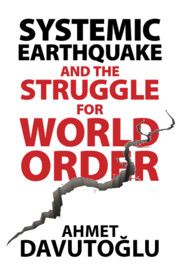Book contents
- Systemic Earthquake and the Struggle for World Order
- Systemic Earthquake and the Struggle for World Order
- Copyright page
- Dedication
- Contents
- Foreword
- Acknowledgments
- Abbreviations
- Introduction: Conceptual and Methodological Framework
- Part I Systemic Earthquake: Analysis and Consequences of World (Dis)Order
- Part II A New Vision: Inclusive Governance
- 5 Future Projections and Basic Principles of a New Order of Inclusive Governance: The Five I’s
- 6 Inclusive National Governance: From Survival to Sustainability
- 7 Inclusive Regional Governance: From Regional Cold Wars to Regional Orders
- 8 Inclusive Global Governance: A New Paradigm of Global Order
- Notes
- Bibliography
- Index
8 - Inclusive Global Governance: A New Paradigm of Global Order
from Part II - A New Vision: Inclusive Governance
Published online by Cambridge University Press: 09 January 2020
- Systemic Earthquake and the Struggle for World Order
- Systemic Earthquake and the Struggle for World Order
- Copyright page
- Dedication
- Contents
- Foreword
- Acknowledgments
- Abbreviations
- Introduction: Conceptual and Methodological Framework
- Part I Systemic Earthquake: Analysis and Consequences of World (Dis)Order
- Part II A New Vision: Inclusive Governance
- 5 Future Projections and Basic Principles of a New Order of Inclusive Governance: The Five I’s
- 6 Inclusive National Governance: From Survival to Sustainability
- 7 Inclusive Regional Governance: From Regional Cold Wars to Regional Orders
- 8 Inclusive Global Governance: A New Paradigm of Global Order
- Notes
- Bibliography
- Index
Summary
The systemic crisis we face today imposes the need for a new paradigm of global order and governance that takes into account the dynamics brought by globalization.
First and foremost, the fate of mankind as a whole now faces a series of very large-scale threats. These threats require an endeavor beyond just optimizing nation-states’ self-interests, because they are of their nature transnational not international. Issues such as climate change, environmental problems, cybercrime, the proliferation of weapons of mass destruction and terror have now reached a scale that presents a threat to everyone, everywhere, and are becoming increasingly difficult to resolve purely through inter-state relations based on “territorial sovereignty and hegemonic geopolitics” . There is a clear need for a comprehensive new system of values in which states and concerned international civil society can participate to address these threats to humanity’s shared destiny, together with conventions based on such a system.
From this perspective in the eight chapter of the book the principal elements of a vision for a possible new global order are analysed and the author’s recommendations on a result-oriented UN reform process are discussed.
Keywords
Information
- Type
- Chapter
- Information
- Systemic Earthquake and the Struggle for World OrderExclusive Populism versus Inclusive Democracy, pp. 224 - 253Publisher: Cambridge University PressPrint publication year: 2020
Accessibility standard: Unknown
Why this information is here
This section outlines the accessibility features of this content - including support for screen readers, full keyboard navigation and high-contrast display options. This may not be relevant for you.Accessibility Information
- 1
- Cited by
